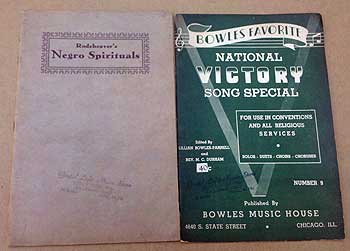I thought you’d like those, the auction staffer said, a big smile on his face. He was feeling this mother lode of age-stained songbooks that lay on the table in front of me. I had just approached them and wasn’t sure what they contained.
Three of the songbooks with tan paper covers were titled “Rodeheaver’s Negro Spirituals.” Seeing them, I instantly knew why he had thought of me. I’m always on the lookout to anything pertaining to African American history and culture at auction.
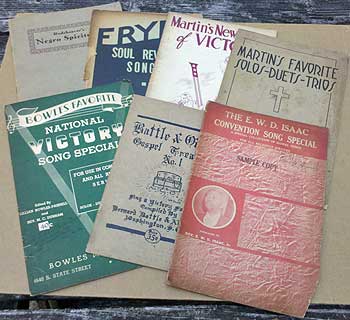
The songbooks were fragile, the pages so brittle that every time I touched one, small pieces dropped from it. The covers had separated from the spines on several. I’m sure the owner had not handled them in decades.
As I flipped through them, I saw that they were not all spiritual but very close. Most were books of gospel sheet music produced by black and white-owned publishing companies :
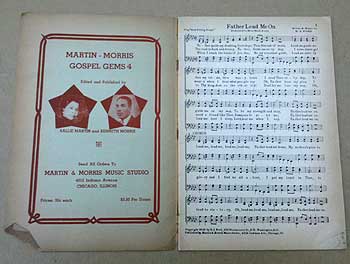
Martin & Morris Music Studios, Chicago.
The (Roberta) Martin Studio of Music, Chicago.
Theodore R. Frye Publishers, Chicago.
Johnnie Howard Franklin, St. Louis.
Battle & Odom Music Agency, Washington, DC.
Bowles Music House, Chicago.
Rodeheaver-Hall Mack Co., Indiana.
Many of the people who wrote or arranged songs published in the books had dedicated them to a husband, a wife, a father, a mother, a church or even a choir director. “Dedicated to our mother Mrs. Eva Madison, National Gospel Singer,” wrote a brother and sister who were credited with the song “You’ve Got to Be Humble” in a Martin & Morris songbook.
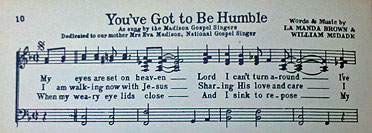
I learned from my research that the black publishing companies sought out composers to write music that they could sell to church gospel choirs in an industry that was only beginning to take root during the 1930s. Chicago became the center of gospel-music publishing and home to some of the largest houses, including the Dorsey House of Music owned by Thomas A. Dorsey, Martin & Morris owned by Kenneth Morris and Sallie Martin, and Bowles owned by Lillian M. Bowles.
The publishing fever began with Dorsey, the man who wrote one of the most amazing gospel songs of all time – “Precious Lord, Take My Hand” – pulling this sorrowful tune out of the pain he was experiencing in 1932 after the death of his wife and son in childbirth.
Dorsey was both exasperated and dissatisfied with how he was treated by mainstream publishing companies and the lackluster way they were distributing his music. In 1932, he established his own company to sell both his music and that of other gospel singers. He was a founder of the National Convention of Gospel Choirs and Choruses (NCGCC), which held sessions each year to teach choirs how to sing gospel music.
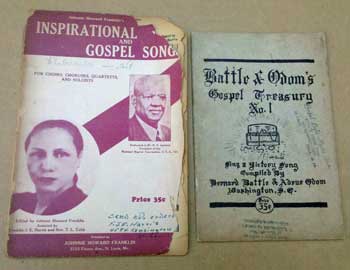
Born in Georgia, he had moved to Chicago as part of the Great Migration in 1919, and brought with him the jazz and blues of his southern origins and interspersed them with sacred music. In the 1930s, he helped organize with Theodore R. Frye the first gospel choir, a concept that spread to other churches in the city and ultimately the country.
With his publishing company, Dorsey – considered the father of black gospel music – had started a movement. Many gospel composers in Chicago followed his lead, but the craze was not confined to that city. I found mention of black gospel publishing houses in Philadelphia; Gary, IN, and Pittsburgh, PA, and I’m sure there were others.
Here’s a sampling of what I found out about some of the houses, whose songbooks I bought at the auction:
Martin & Morris
Kenneth Morris and Sally Martin opened their publishing house in 1940 and it outlasted all of the rest, dissolving in the 1990s. Morris arranged and composed most of the music (he wrote 300 songs, including “Just a Closer Walk with Thee,” an early version of which he had overheard a train porter singing), while Martin spent her time promoting the company. Their catalog of songs is housed in the Harold Washington Library Center in Chicago.
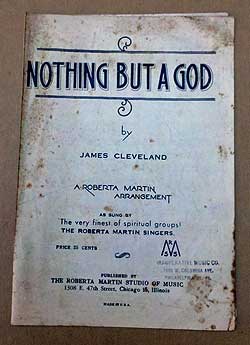
Martin’s Studio of Music
Roberta Martin was a singer, pianist, composer, and arranger who formed the Roberta Martin Singers, which at one point included Dinah Washington and Della Reese. She founded her music company in 1939, focusing on her own songs and those of James Cleveland, Dorothy Norwood and others through the years. The lot of songbooks at auction included sheet music for a song titled “Nothing But A God” written by Cleveland, arranged by Martin and sung by the Roberta Martin Singers.
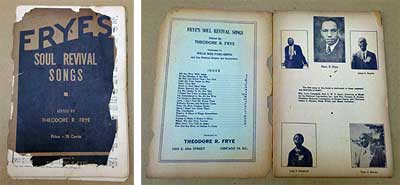
Theodore R. Frye
Theodore R. Frye was a singer who was said to be able to move a congregation with his baritone voice. Also a composer, he started his publishing house in 1948 and was a co-founder of the NCGCC with Dorsey and others. He worked with Mahalia Jackson during the 1940s.
Homer Rodeheaver was a white publisher. Kenneth Morris worked for Bowles’ company for about six years transcribing music before starting his own.
